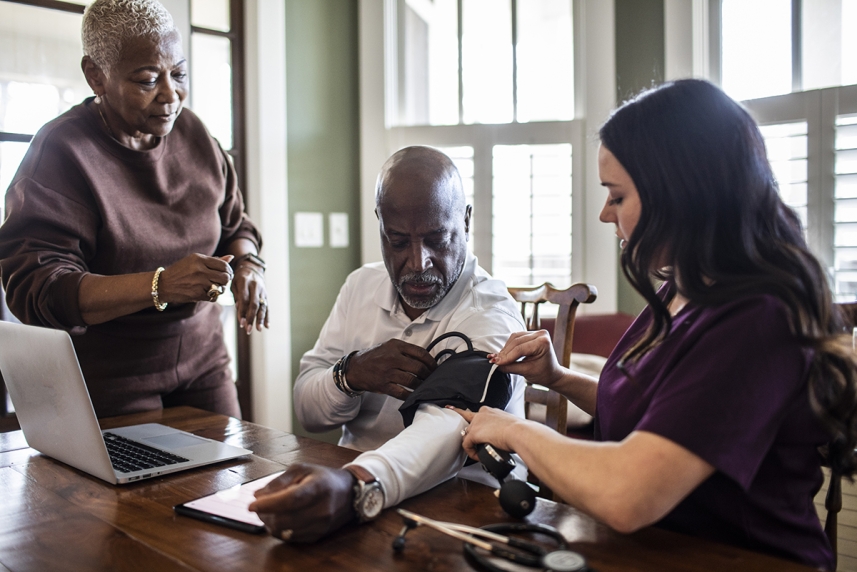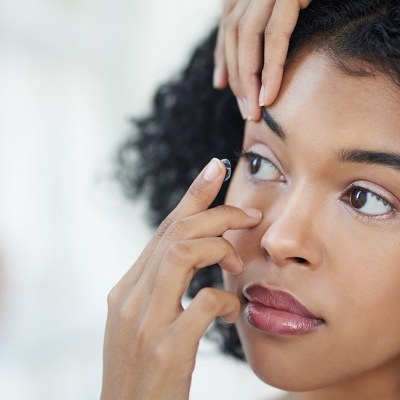How high blood pressure can put your vision at risk
Protect your heart and your eyes with these tips for keeping blood pressure in check.

High blood pressure (hypertension) affects more than your heart. “It can damage any of the blood vessels in the body, including those in the eyes,” says retinal specialist Stefanie G. Schuman, M.D., at the Duke Eye Center at Duke Health.
There are blood vessels in the retina — the layer of cells in the back of your eye — that are “very sensitive to changes in blood pressure,” Dr. Schuman says. As many as 47% of adults in the United States have high blood pressure. That’s a blood pressure reading greater than 130 mm Hg/80 mm Hg, according to the Centers for Disease Control and Prevention (CDC).1
Having elevated blood pressure for a long period of time can cause changes in the eye that affect your vision. In some cases, it can lead to vision loss that cannot be corrected. For example, high blood pressure can compromise blood flow and damage the optic nerve. The optic nerve is what carries messages from the retina to the brain, allowing you to see. You could also get an aneurysm in your eye. That’s when a blood vessel becomes blocked. That causes fluid to leak into the center of your vision, the macula. The macula is what you use to read, drive, and see a person’s face. “Suddenly, someone may notice that there’s something wrong with their vision,” says Dr. Schuman.
That sounds alarming. But those changes to the eyes usually only happen after years of high blood pressure, says Alexander Anetakis, M.D., clinical assistant professor of ophthalmology at the University of Pittsburgh. The good news is that monitoring and treating high blood pressure can safeguard your sight.
Looking for a new eye care provider? Search the UnitedHealthcare Vision Network now.
Keep an eye on your blood pressure
The U.S. Department of Health and Human Services (HHS) recommends getting your blood pressure taken annually if you’re over age 40 or have a high risk of hypertension. Healthy adults ages 18 to 39 should get their blood pressure checked every 3 to 5 years.2
If you have diabetes, it’s extra important to watch your blood pressure. Two-thirds of people with diabetes also have high blood pressure, according to the American Diabetes Association.3
Get a dilated eye exam
“Any patient over 40 who has high blood pressure should have a dilated eye exam,” Dr. Schuman advises. If you are pregnant and have high blood pressure, you should also get an eye exam. Your eyes are more sensitive to blood pressure changes during pregnancy, she adds.
No matter your health history and risk, everyone should get a complete eye exam at age 40, advises the American Optometric Association.4 “There are quite a few eye diseases that are silent in their early stages but if caught early can be treated effectively,” says Dr. Anetakis. That’s done with a dilated eye exam.
A dilated exam allows the doctor to see the blood vessels in your eyes. If you know you have high blood pressure, tell your eye care provider. They will carefully look at each eye’s blood vessels and check them for changes. The exam can even show if your blood pressure is well controlled. If it’s not, your eye care provider may talk to your primary care doctor about any changes in treatment, Dr. Anetakis says.
Sometimes, an eye care provider is the first person to flag high blood pressure in a patient. The eyes are the “only place in the body where you can see blood vessels actively working without doing anything invasive,” says Dr. Anetakis. And those blood vessels show the effects of high blood pressure over time.5 Bottom line: Don’t skip dilation.
Make healthy lifestyle changes
Only 1 in 4 adults with hypertension have the disease under control, says the CDC.1 Getting high blood pressure back down to normal levels (less than 120/80 mm Hg) will help stop damage to blood vessels from progressing. To successfully reach those numbers, lifestyle changes may be needed. Focus on eating a heart-healthy diet. It should limit red meat, sugary foods and drinks, and sodium and be rich in fruits, veggies, whole grains, low-fat dairy, lean meat, and nuts and legumes. Staying physically active (don’t underestimate the value of walking), managing stress, and taking medications as needed to treat high blood pressure or diabetes will help keep your sight sharp — and your body healthy — as you age.
Providers in the UnitedHealthcare Vision Network are here to help keep your vision healthy. Search for an eye care provider now.
Sources:
- Facts about hypertension in the United States Centers for Disease Control and Prevention, last reviewed January 2023.
- Get your blood pressure checked U.S. Department of Health and Human Services, last updated July 2022.
- Diabetes and high blood pressure American Diabetes Association
- See the full picture of your health with a comprehensive annual eye exam American Optometric Association
- Your Eyes Could Be the Windows to Your Health American Academy of Ophthalmology, December 2014.


